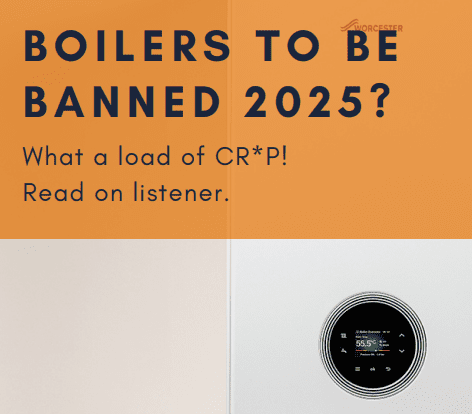Air Source Heat Pump Intallations Somerset
Design, Installation & Service
"BUS" Grant Now Available!
£7,500
What is a Air Source Heat Pump?
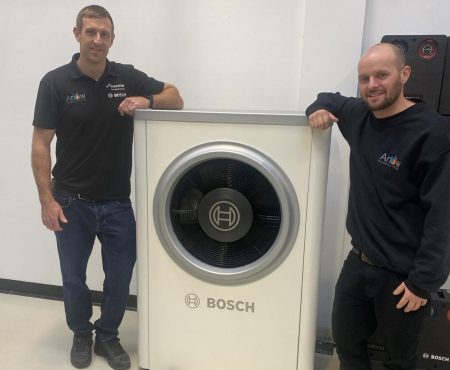
An air source heat pump (ASHP) is a highly efficient heating and cooling system that captures heat from the outside air and transfers it indoors. Even in cold weather, it can extract heat from the air, making it ideal for providing year-round climate control. During winter, it provides warmth by transferring outdoor heat inside.
Air source heat pumps operate using a refrigerant cycle. The system consists of an outdoor unit containing a coil filled with refrigerant, which absorbs heat from the outside air. A compressor then increases the refrigerant’s pressure, raising its temperature. The heated refrigerant is pumped to an indoor unit where the heat is released into your home, either through radiators, underfloor heating, or an air handling unit.
Throughout the process, the refrigerant changes from liquid to gas and back, enabling efficient heat transfer. ASHPs are typically more efficient than traditional systems because they move existing heat rather than generating it, using less electricity to provide more energy output. They work best in well-insulated homes and can significantly reduce energy bills and carbon emissions.
Gas Boilers vs. Air Source Heat Pumps: What’s the Best Fit for You?
When it comes to heating your home, you have a couple of main options: gas boilers and air source heat pumps. Both have their pros and cons, so let’s take a friendly look at what each one offers to help you make an informed choice.
Pros:
- Quick to Heat: Gas boilers heat your home quickly, so you’re not waiting around for warmth.
- Familiar Technology: Many homes are already set up for gas boilers, making installation relatively straightforward.
- Lower Upfront Costs: Generally, gas boilers are less expensive to install than air source heat pumps.
Cons:
- Carbon Footprint: Burning gas releases carbon dioxide, contributing to climate change.
- Running Costs: While gas prices can vary, they might be more volatile and could increase over time.
- Maintenance: Gas boilers require regular maintenance to ensure they are running safely and efficiently.
Air Source Heat Pumps: The Modern Option
What They Are:
Air source heat pumps are a newer technology that extracts heat from the outside air (even when it’s cold) and transfers it inside to heat your home. They can also provide cooling in the summer.
Pros:
- Eco-Friendly: Heat pumps use renewable energy from the air, reducing your carbon footprint.
- Efficiency: They can be more energy-efficient than gas boilers because they move heat rather than generate it.
- Lower Running Costs: Although the initial investment is higher, they can be cheaper to run due to their efficiency.
- Versatility: Many heat pumps can also provide cooling during hot weather.
Cons:
- Higher Upfront Costs: The initial installation cost is generally higher than that of a gas boiler.
- Temperature Limits: They work best in well-insulated homes and might need a backup heating source in very cold weather.
- Installation Complexity: The installation process can be more involved, especially if your home isn’t already set up for heat pumps.
- Energy Efficiency: If you’re looking to lower your energy bills and reduce your carbon footprint, an air source heat pump could be the better choice.
- Budget: If upfront cost is a major concern, a gas boiler might be more affordable initially, but think about long-term running costs and potential increases in energy prices.
- Home Insulation: Heat pumps perform best in well-insulated homes. If your home needs more insulation, that might be an important consideration.
Ultimately, both options have their benefits, and the best choice depends on your specific needs, budget, and environmental goals. If you need more tailored advice, feel free to get in touch with us!
GAS BOILERS
Vs HEAT PUMPS
Benefits of a Air Source Heat Pump
Energy Transfer, Not Creation
Heat pumps work by transferring heat from the air, ground, or water into your home, rather than generating heat from burning fuel. This process is highly efficient because it uses ambient energy to heat your space, requiring less electricity than conventional systems.
Renewable Energy Source
Heat pumps utilize renewable sources like air or geothermal energy. Even in colder temperatures, they extract heat from the environment, making them a sustainable alternative to fossil fuel-based systems.
Low Operating Costs
Due to their efficiency, heat pumps can produce 3-4 times more energy than they consume in electricity. This translates to lower running costs and a reduced carbon footprint, especially when powered by green energy sources like solar.
Consistent Temperature Control
Heat pumps provide a steady and even distribution of temperature throughout your home. Unlike traditional heating systems that create bursts of heat, heat pumps maintain a constant comfort level, reducing hot and cold spots.
Efficient Energy Use
Heat pumps transfer heat rather than generate it, using 300-400% less electricity than traditional systems. Even in cold weather, they pull warmth from the air or ground to heat your home.
Eco-Friendly
Powered by renewable energy sources, heat pumps help lower carbon emissions and work sustainably, reducing your environmental footprint.

Playing devil's advocate, while heat pumps offer impressive benefits, there are some potential downsides worth considering:
- Upfront Costs: Heat pumps tend to have higher installation costs compared to conventional heating systems. Ground-source heat pumps, in particular, require significant excavation, which can be costly and impractical in certain properties.
- Efficiency in Cold Climates: While air-source heat pumps can extract heat even in cold weather, their efficiency drops off in freezing temperatures
- Complex Installation: Installing a heat pump system can be complex and requires specialized knowledge. Poor installation and design can affect performance, efficiency, and longevity, making it crucial to find experienced installers.
- Space Requirements: Both air-source and ground-source heat pumps need space. Air-source units require external space for the unit, which can be noisy. Ground-source units require significant land area for installation, which may not be available in smaller properties.
Quickshot Checklist
Is a air source heat pump a good fit for your home?
Air source heat pumps can be a great heating solution for your home, but to get the best performance, your home needs to meet a few key requirements:
 Well insulated home
Well insulated home
 Sufficient outdoor and indoor space
Sufficient outdoor and indoor space
 Low flow temperature below 55° C
Low flow temperature below 55° C
 Installation location, which doesn’t amplify sound
Installation location, which doesn’t amplify sound
Getting Started with Your Air Source Heat Pump: What to Think About
Before installing an air source heat pump, it’s important to decide if it’s the right choice for your home. There are three key things to keep in mind: the size of the unit, where to install it, and how efficient it will be. Your installer will guide you through the details, but here’s a quick breakdown.
Monobloc (Single Unit):
Split System (Two Units):
A split system has both an indoor and outdoor unit. With the heat transfer happening indoors, it’s more efficient and minimizes heat loss. While it takes up more indoor space and has higher installation costs, its efficiency can save you money in the long run.
Where’s the Best Spot?
Your outdoor unit should be placed at least 3 metres away from your neighbours to minimize noise. It’s a good idea to avoid putting it directly under a bedroom window, and make sure there’s enough room around it for proper air flow.
Indoors, the unit usually goes in the utility room and needs about 1 square metre of space. In apartments, the outdoor unit will need about 2 square metres. Monobloc systems may require additional space considerations due to distance regulations.
How Efficient Will It Be?
The efficiency of your heat pump depends on the Seasonal Coefficient of Performance (SCOP), which takes your local climate into account. A heat pump’s Coefficient of Performance (COP) shows how much heat it produces compared to the electricity it uses.
For example, a COP of 4 means it produces four times as much heat as the energy it consumes. The higher the SCOP, the more efficient the system will be in your area.
Do I Need a Hot Water Tank with an Air Source Heat Pump?
Great question! Whether you need a hot water tank with your air source heat pump (ASHP) really depends on your specific setup and hot water needs.
Many ASHP systems work best with a hot water tank, allowing you to enjoy a steady supply of hot water for showers, washing, and other daily activities. This way, you can ensure that you always have enough hot water on hand when you need it!
However, there are some systems that can provide hot water directly without needing a separate tank, but these are less common. It’s a good idea to consider how much hot water your household uses to determine the best option for you.
How Much Room Do I Need?
Outdoor Unit:
Your outdoor unit will need about 1 to 2 meters of space around it for proper airflow and easy maintenance. It’s best to keep it about 3 meters away from walls or windows to help reduce noise and ensure it runs efficiently.
Indoor Unit:
If your system includes an indoor unit, it usually requires around 1 square meter of space, which could fit nicely in a utility room or basement.
If you decide to go with a hot water tank, you’ll need a bit more space—typically around 1 squared meter for the tank.
Why choose us?
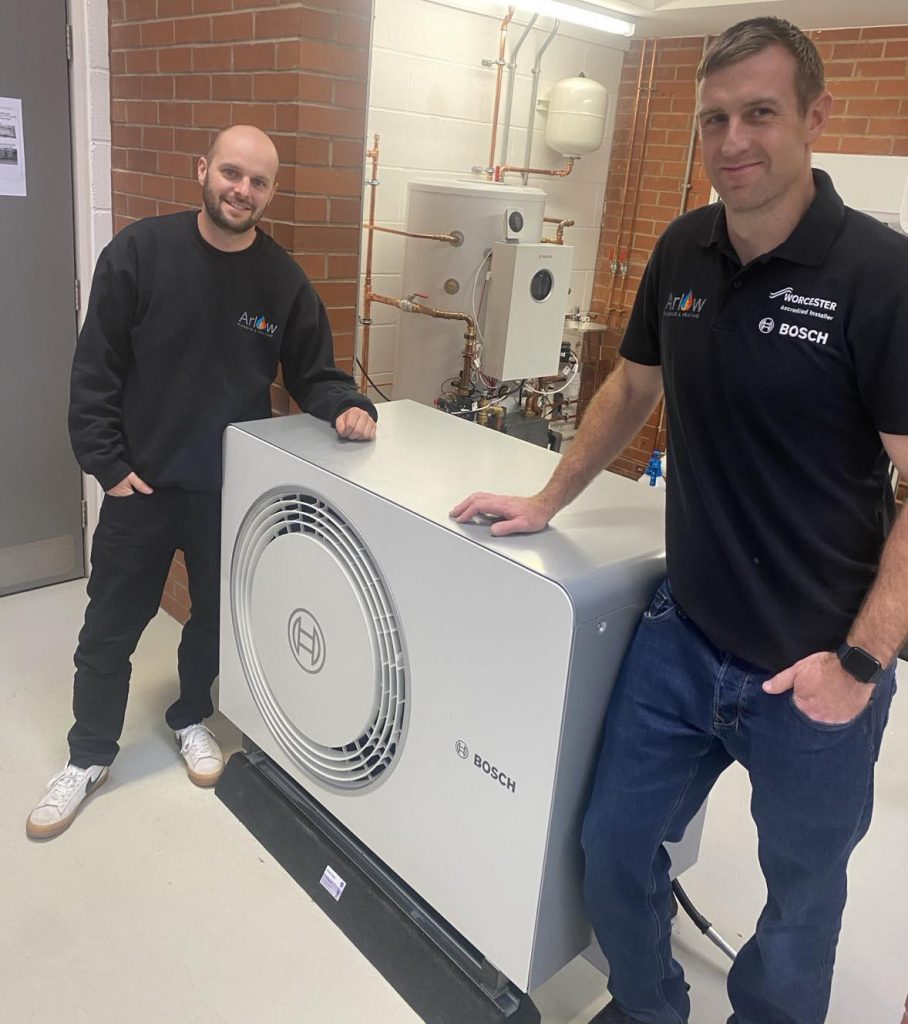
 Reviews
Reviews
We are thrilled to announce that we have received over 550 5-Star reviews on both Google and Trustpilot. This is a true testament to our commitment to delivering high-quality products/services and exceptional customer service.
 Professionalism
Professionalism
We pride ourseleves on our professionalism. From the moment you contact us to the completion of the installation, we aim to minimize any disruption to your daily routine and will always leave your property clean and tidy.
 Great Value
Great Value
Competitive pricing and different options to make the process more affordable for you.
 Accreditation
Accreditation
Fully accredited with Worcester Bosch, Gas Safe and OFTEC. Our team of experts continually receieve extensive training and certifications to ensure that we are up to date with the latest technology and installation techniques.
 Extended Guarantees
Extended Guarantees
Accredited partnership with Worcester Bosch offering a direct extended manufacture guarantee unlike a lot of online companies.
 Full Insurance
Full Insurance
Giving you peace of mind that you and your property are in safe hands.
What is the Boiler Upgrade Scheme (BUS) ?
To help the UK reach its net zero goals, the government is encouraging homeowners to switch from fossil fuel boilers to more energy-efficient options like heat pumps.
The Boiler Upgrade Scheme (BUS) provides financial support to make installing low-carbon heating solutions more affordable. Since heat pumps are more expensive and take longer to install than gas boilers, the BUS helps reduce upfront costs for homeowners in England and Wales.
This scheme is available until 2028 with an additional £1.5 billion budget as part of a larger £4 billion plan to cut emissions (September 2024).
Additionally, 0% VAT is offered on the installation of energy-saving materials, including heat pumps, until March 2027.
How Can It Help with Heat Pumps?
As of September 2024, the BUS grant continues to support heat pump installations:
- £7,500 towards an air source heat pump.
This funding helps make switching to greener heating systems more affordable.
Who is Eligible?
- Homeowners and small business owners in England and Wales.
- Your property needs an up-to-date Energy Performance Certificate (EPC) with no outstanding insulation recommendations.
- Check if you are eligible here
How Does It Work?
- Work with a Certified Installer: Your installer will apply for the grant on your behalf, so you don’t have to handle the paperwork.
- Receive a Discount: The grant is deducted from the installation cost—£7,500 off the price of your heat pump system!
Switching to a heat pump in 2024 is easier and more cost-effective than ever, thanks to the Boiler Upgrade Scheme. It’s a great way to reduce your carbon footprint while keeping your home energy-efficient.
EPC Qualification for Boiler Upgrade Scheme: Eligibility Criteria and Requirements
The most common way people use to qualify for the BUS is using their properties Energy Performance Certificate (EPC). In order for an EPC to be eligible for the grant, it must show no recommendations for loft or cavity wall insulation.
It is worth noting that as this is the Boiler Upgrade Scheme, the EPC should show that the current heating is provided by a boiler, this also could be electric heating but it cannot be heated by a heat pump.
This route is open to both domestic home owners, landlords and commercial property owners.
What is a Distribution Network Operator (DNO) ?
A DNO (Distribution Network Operator) is the company that manages the electrical distribution network in your area. They ensure electricity is safely delivered to homes and businesses.
Why is it Important for Heat Pumps?
Heat pumps can draw a lot of electricity, especially larger systems. Before installing a heat pump, your installer may need to notify the DNO to ensure your local grid can handle the extra load. This is important for two main reasons:
- Safety: It helps avoid overloading the electricity network.
- Power Upgrades: If your home needs extra electrical capacity for the heat pump, the DNO can help arrange this.
By working with your DNO, we make sure your heat pump operates smoothly and safely.
Q & A
Thinking about heat pump installation?
Do you need a new heat pump installation or service? We are local trusted installers in Bridgwater, Taunton, North Petherton, Burnham on sea, Highbridge and Cannington.
For our full range of heat pumps or associated heating controls click the links provided furthermore contact us on arlow@arlowplumbing.co.uk
The Bridgwater Plumbing Blog
Newsletter May 2023
You may have heard in the media that gas and oil boilers are being phased out… what does this mean for you ? Click here to view the newsletter
Magnetic filters, are they worth it?
Magnetic filters, are they worth it? Did you know? A high proportion of boilers that fail in the first year do so because of poor water quality, by introducing a proper system cleaning method and the installation of an in-line magnetic system filter, we can significantly improve the efficiency and life expectancy of every households […]
Boiler servicing, Money for old rope?
Boiler servicing, Money for old rope? Boiler servicing, it is one of those things that is easily overlooked, yet it is an essential part of your household duties. By having your boiler serviced every 12 months you will be picking up on issues before they become real problems, a boiler service will be protecting you […]


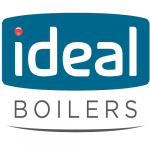




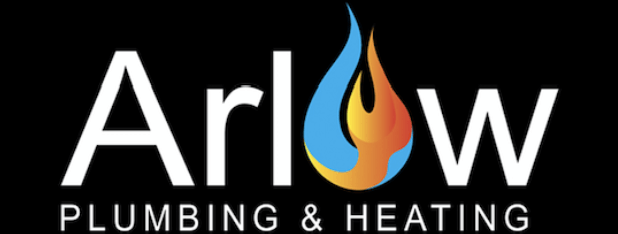

 Reviews
Reviews